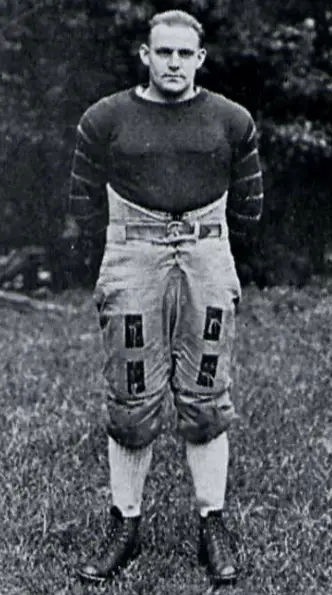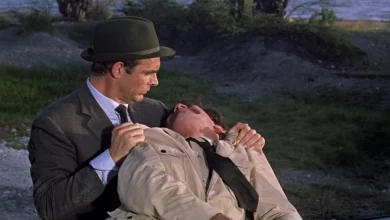The James Bond and American Football Connexion !

In the realm of American football, certain names transcend the boundaries of time, leaving an enduring impact that reverberates through generations. James Donald Bond Jr. is one such name, etched into the tapestry of football history as a player, coach, and inspiration. From his early days as a high school athlete to his heroic service during World War I and his coaching achievements, Bond’s journey encapsulates the essence of dedication, resilience, and a deep love for the game. This article delves into the life and legacy of James Donald Bond Jr., uncovering the chapters that make up his remarkable football odyssey.
Key Takeaways
- Versatility and Dedication: Bond’s ability to excel both on the field as a player and on the sidelines as a coach showcases his versatility and unwavering dedication to the sport. His journey underscores the transformative power of football in shaping not only athletic careers but also character and leadership.
- Impact Beyond Borders: While Bond’s football journey primarily unfolded within the United States, his legacy resonates on a global scale. His experiences, lessons, and contributions serve as a universal source of inspiration for athletes and enthusiasts around the world.
- Lessons for Today: Bond’s story offers timeless lessons for aspiring athletes, coaches, and fans. His resilience, commitment, and ability to adapt in the face of challenges stand as pillars of success, encouraging individuals to embrace the values that define excellence in sports and beyond.
James Donald Bond Jr.: A Remarkable Football Journey
James Donald Bond Jr., a name etched in the annals of American football history, left an indelible mark on the sport as both a player and a coach. Born on February 14, 1894, in Painesville, Ohio, Bond’s journey through the world of football is a testament to his dedication, resilience, and passion for the game.
Early Life and Education
Hailing from the Morningside neighborhood in Pittsburgh, Bond’s love for sports ignited at Central High School, where he showcased his talent in football, baseball, and track. In 1914, he embarked on his academic and football journey at the University of Pittsburgh, setting the stage for a remarkable career that would span over a decade.
Bond’s College Football Odyssey
Bond’s college football odyssey began in 1915 when he donned the Pittsburgh Panthers jersey as a reserve guard under the tutelage of the legendary Glenn Scobey “Pop” Warner. His commitment to the game was momentarily interrupted by military service during World War I. Assigned to Camp Gordon, Bond played for the camp’s football team, showcasing his prowess even in the face of adversity.
Deployed with the 82nd Infantry Division to France, Bond displayed unwavering courage on the Western Front, where he was wounded and gassed during the Battle of Saint-Mihiel. After months of recovery, he returned to the University of Pittsburgh in August 1919, earning praise as a war hero and a formidable addition to the Panthers’ roster.
Bond’s Triumphs on and off the Field
Bond’s return to the football field was met with acclaim, with sports journalists noting his transformation into a standout guard under Pop Warner’s guidance. He played a pivotal role in Pitt’s varsity football teams of 1919 and 1920, showcasing his commitment to excellence both as an athlete and a leader.
Transitioning from player to coach, Bond embarked on a coaching career that saw him making significant contributions to various institutions. His journey as a coach began as an assistant coach under Charley Moran at Centre College in 1922, where his impact was felt immediately. Centre’s 1922 team enjoyed an 8–2 record, a testament to Bond’s coaching acumen.

Bond’s Coaching Stints and Beyond
Following his successful stint at Centre College, Bond’s coaching journey led him to the University of Buffalo in 1923. While the team’s record that year was 2–5–1, Bond’s influence was undeniable. He continued to share his knowledge and passion for the game as a football coach at Canisius College in 1924 and as the athletic director and football coach at Albright College from 1925 to 1926.
Bond’s connection with the game extended beyond coaching. In the fall of 1926, he donned the jersey once again, this time as a guard for the Brooklyn Lions of the National Football League. His contributions on the field showcased his versatility and dedication to the sport he loved.
Legacy and Later Years
Bond’s football journey eventually transitioned to other pursuits, with his legacy enduring through his involvement in Pittsburgh’s sports community. He worked as a baseball umpire and played a pivotal role in the Pittsburgh Umpires Association. His post-football career also saw him employed by a refining company, highlighting his versatility beyond the realm of sports.
James Donald Bond Jr. passed away on April 9, 1956, in Pittsburgh, leaving behind a legacy that continues to inspire football enthusiasts and athletes alike. His journey from a high school athlete to a college football standout, a war hero, and a respected coach, showcases the transformative power of sports in shaping lives and leaving a lasting impact.
The Bond Franchise and American Football: A Historical Overview
- 1960s-1970s: During the early years of the Bond franchise, American football was gaining significant traction in the U.S. While Bond films like “Goldfinger” and “Live and Let Die” were hitting the big screen, the NFL was undergoing major changes, leading to the eventual Super Bowl era.
- 1980s-1990s: As Bond underwent a transformation with actors like Roger Moore and Timothy Dalton, American football saw the rise of legendary players like Joe Montana and Jerry Rice. The sport’s popularity skyrocketed, and its influence began to permeate pop culture, including films and television.
- 2000s-Present: With Daniel Craig taking on the role of 007 and the NFL becoming a global phenomenon, the intersections between Bond and American football became more pronounced. Bond films started featuring more American characters, and the NFL began hosting games in London, further intertwining the two.
Bond Actors and Their Connection to American Football
Several actors who played Bond or had significant roles in the franchise have connections to American football:
- Sean Connery: Before his acting career, Connery was reportedly offered a trial with Manchester United, a soccer team. While not American football, it shows his athletic prowess.
- Richard Kiel (Jaws in “The Spy Who Loved Me” and “Moonraker”): Standing at 7’1″, Kiel could have easily been a formidable player in the NFL.
American Football in Bond Films
While American football hasn’t been a central theme in any Bond film, there have been subtle nods:
-
- In “Diamonds Are Forever,” Bond impersonates a diamond smuggler who is a fan of an American football team.
- Some Bond villains, with their physical stature and aggressive tactics, could easily be compared to NFL linebackers or defensive ends.

FAQ:
1. What was James Donald Bond Jr.’s role in American football history?
James Donald Bond Jr. made significant contributions to American football both as a player and a coach. Born on February 14, 1894, in Painesville, Ohio, Bond’s legacy extends from his time as a reserve guard at the University of Pittsburgh to his coaching stints at various institutions. His journey reflects the evolution of the sport and highlights the transformative power of dedication and resilience.
2. How did Bond’s military service impact his football career?
Bond’s football career was temporarily interrupted by his service in World War I. Assigned to Camp Gordon and subsequently deployed to France with the 82nd Infantry Division, Bond’s dedication to the game remained steadfast even in the face of adversity. His experiences on the Western Front, including being wounded and gassed at the Battle of Saint-Mihiel, shaped his character and added depth to his football journey.
3. What coaching achievements are associated with James Donald Bond Jr.?
Bond’s coaching career included notable achievements. As an assistant coach at Centre College, he contributed to the team’s impressive 8–2 record in 1922. Bond’s impact extended to the University of Buffalo, Canisius College, and Albright College, where he shared his knowledge and passion for the sport. His coaching legacy showcases his ability to inspire and guide athletes.
4. How did Bond’s transition from player to coach influence his football journey?
Bond’s transition from player to coach marked a pivotal moment in his football journey. After playing a significant role on the field, he embraced coaching with the same dedication. This transition allowed Bond to channel his expertise and experiences into shaping the next generation of athletes, leaving an enduring impact on the sport.
5. What role did Bond play in Pittsburgh’s sports community beyond coaching?
Beyond coaching, Bond continued to be involved in Pittsburgh’s sports community. He worked as a baseball umpire and played a role in the Pittsburgh Umpires Association. Bond’s diverse involvement highlights his versatility and commitment to contributing to the sports landscape in various capacities.
6. How did Bond’s versatility as a player and coach set him apart?
Bond’s versatility as both a player and a coach distinguishes him in football history. His ability to excel on the field and subsequently share his insights as a coach showcased his comprehensive understanding of the game. This versatility allowed Bond to make a lasting impact on different aspects of football.
7. What inspired Bond to return to football after his military service?
Bond’s return to football after his military service was fueled by his passion for the game. Despite facing challenges and injuries during World War I, Bond’s love for football remained undiminished. His determination to continue playing and coaching demonstrated his unwavering commitment to the sport he cherished.
8. How did Bond’s contributions to football extend beyond the United States?
While Bond’s football journey primarily unfolded in the United States, his experiences as a player and coach resonated globally. His dedication to the sport and his role in shaping athletes’ lives transcend borders, serving as a testament to the universal appeal and impact of American football.
9. What lessons can aspiring athletes and coaches learn from Bond’s journey?
Bond’s journey offers valuable lessons to aspiring athletes and coaches. His resilience in the face of challenges, his dedication to improvement, and his ability to adapt to different roles exemplify the qualities that contribute to success in sports. Bond’s story serves as an inspiration to those who aim to make their mark in the world of football.
10. How does Bond’s legacy continue to influence American football today?
Bond’s legacy continues to influence American football by reminding us of the importance of dedication, versatility, and a deep passion for the sport. His journey serves as a beacon for players, coaches, and fans, encouraging them to embrace the transformative power of football and leave their own mark on the game’s rich history.
Conclusion: A Lasting Tribute
As the echoes of Bond’s football journey reverberate through the ages, they serve as a lasting tribute to the enduring spirit of the sport. Bond’s legacy goes beyond statistics and accolades; it encapsulates the heart and soul of American football. From the early days of Central High School to his pivotal coaching roles, Bond’s impact is felt in every yard gained, every lesson imparted, and every heart inspired. As football enthusiasts and athletes continue to step onto fields across the nation, they carry with them the torch ignited by Bond—a torch that illuminates the path toward greatness, camaraderie, and the timeless beauty of the game. James Donald Bond Jr.’s story is a testament to the profound influence that one individual can have on a sport, a community, and the generations that follow.










